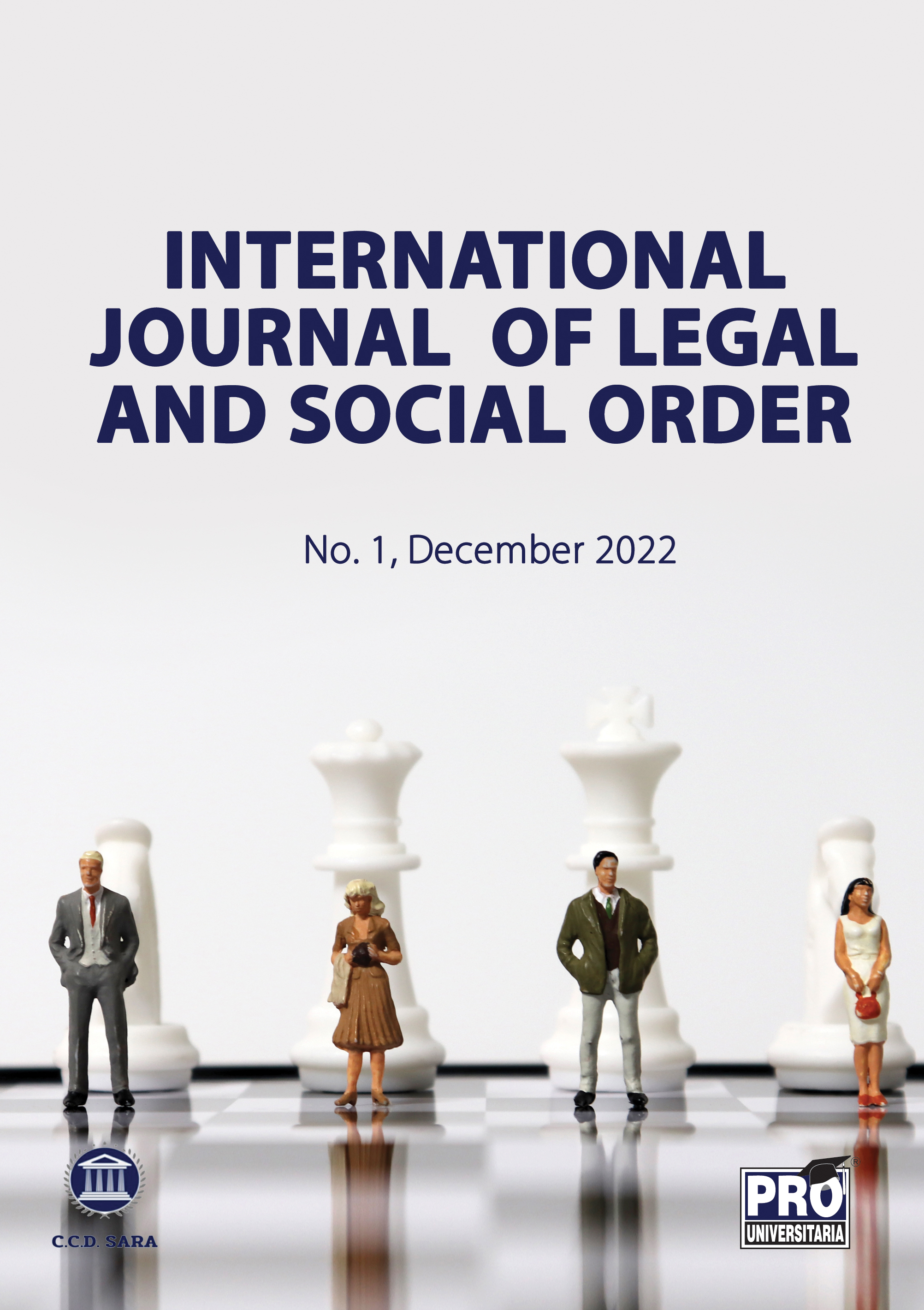EXCESSIVE DEFICIT PROCEDURE: PAST, PRESENT, PERFECT?
DOI:
https://doi.org/10.55516/ijlso.v1i1.68Keywords:
excessive deficit procedure; European economic governance; debt reduction benchmark; European Court of Auditors;Abstract
The Economic and Monetary Union combines a single monetary policy with decentralised economic, especially fiscal policies under the responsibility of Member States. From the Treaty of Maastricht the EU is trying to optimise the specific institutions of one-armed European economic governance – with more or less success. The excessive deficit procedure is an elementary part of the system. The study focuses on the changes and criticism of the procedure paying particular attention to public debt and the sanctions that may be imposed.
References
Regulation (EC) 1466/97 of the Council of 7 July 1997 on the strengthening of the surveillance of budgetary positions and the surveillance and coordination of economic policies. OJ L 209, 2.8.1997, p. 1–5;
Regulation (EC) 1467/97 of the Council of 7 July 1997 on speeding up and clarifying the implementation of the excessive deficit procedure. OJ L 209, 2.8.1997, p. 6–11;
Regulation (EC) 479/2009 of the Council of May 2009 on the application of the Protocol on the excessive deficit procedure annexed to the Treaty establishing the European Community OJ L 145, 10.6.2009, p. 1–9;
Regulation (EU) 1173/2011 of the European Parliament and of the Council of 16 November 2011 on the effective enforcement of budgetary surveillance in the euro area. OJ L 306, 23.11.2011, p. 1–7;
Regulation (EU) 1176/2011 of the European Parliament and of the Council of 16 November 2011 on the prevention and correction of macroeconomic imbalances OJ L 306, 23.11.2011, p. 25–32;
Regulation (EU) 1177/2011 of the Council of 8 November 2011 amending Regulation (EC) 1467/97 on speeding up and clarifying the implementation of the excessive deficit procedure. OJ L 306, 23.11.2011, p. 33–40;
Regulation (EU) 472/2013 of the European Parliament and of the Council of 21 May 2013 on the strengthening of economic and budgetary surveillance of Member States in the euro area experiencing or threatened with serious difficulties with respect to their financial stability. OJ L 140, 27.5.2013. p. 1–10;
Implementing Decision (EU) 2012/156 of the Council of 13 March 2012 suspending commitments from the Cohesion Fund for Hungary with effect from 1 January 2013 OJ L 78, 17.3.2012, p. 19–20;
Regulation (EU, Euratom) 2020/2092 of the European Parliament and the Council of 16 December 2020 on a general regime of conditionality for the protection of the Union budget OJ L 433 I, 22.12.2020, p. 1–10;
Decision (EEC) 90/141 of Council of 12 March 1990 on the attainment of progressive convergence of economic policies and performance during stage one of economic and monetary union OJ L 78, 24.3.1990, p. 23–24;
Resolution of the European Council of 17 June 1997 on the Stability and Growth Pact. OJ C 236, 2.8.1997. p. 1;
Council Recommendation of 12 July 2022 on the 2022 national reform Programme of Hungary and delivering a Council opinion ont he 2022 Convergence programme of Hungary. OJ C 334, 1.9.2022, p. 136–145;
COM(2020) 55 final Communication from the Commission: Economic governance review Report on the application of Regulations (EU) No 1173/2011, 1174/2011, 1175/2011, 1176/2011, 1177/2011, 472/2013 and 473/2013 and on the suitability of Council Directive 2011/85/EU;
COM(2020) 68 final Report from the Commission Romania Report prepared in accordance with Article 126(3) of the Treaty on the Functioning of the European Union;
COM(2021) 915 final Communication from the Commission: Assessment of action taken by Romania in response to the Council Recommendation of 18 June 2021 with a view to bringing an end to the situation of an excessive government deficit in Romania;
COM(2022) 85 final Communication from the Commission: Fiscal policy guidance for 2023; COM(2022) 630 final Report from the Commission: Belgium, Bulgaria, Czechia, Germany, Estonia, Greece, Spain, France, Italy, Latvia, Lithuania, Hungary, Malta, Austria, Poland, Slovenia, Slovakia and Finland Report prepared in accordance with Article 126(3) of the Treaty on the Functioning of the European
UnionCase C-27/04 Commission of the European Communities v Council of the European Union;
(State Audit Office of Hungary) Állami Számvevőszék: Elemzés az Európai Bizottság 2004–2020. között a tagállamokról készített értékeléseiről 2. rész: Összehasonlító elemzés. 2020. október. https://www.asz.hu/storage/files/files/elemzesek/2020/elemzes_20042020_2_20201002.pdf?download=true (30.09.2022);
Angyal, Zoltán: Európai ítélet. A túlzott hiány esetén követendő eljárás menete a közösségi jogban: az Európai Bíróság ítélete a Bizottság kontra Tanács ügyben. Európai Tükör, 2004/8. p. 76–92;
Ramona Ciobanu–Zoltán Varga: Romanian and Hungarian Fiscal Systems. Regulations and Fiscal Apparatus. Transilvania University of Brasov. Bulletin. Series VII: Social Sciences, Law 2020. 13 (62) pp. 307–317;
Csűrös, Gabriella: Uniós pénzügyek. Az európai integráció fejlődésének pénzügyi jogi vizsgálata. HVG-ORAC, Budapest, 2015;
Cîrmaciu, Diana, Romania`s public finances: where are we now?, în European Integration Studies, vol. 17, nr. 2 (2021), https://doi.org/10.46941/2021.e2.67-73 ;
European Central Bank: Public Finances and Long-Term Growth in Europe –Evidence from a Panel Data Analysis. ECB Working Paper 246/2003. https://www.ecb.europa.eu/pub/pdf/scpwps/ecbwp246.pdf?9fc3689ef8dd20d85867f8b601f0e035 (30.10.2022.);
European Court of Auditors: Special Report 10/2016;
European Court of Auditors: Special Report 16/2020;
Fábián, Klaudia–Varga, Zoltán: Az Európai Unió költségvetési szabályozásáról.PUBLICATIONES UNIVERSITATIS MISKOLCINENSIS SECTIO JURIDICA ET POLITICA Sectio juridica et Politica, Tomus 1/2021. pp. 81-115;
Halász, Zsolt: Az Európai Unió költségvetésének szabályozása. Budapest, Pázmány Press, 2018;
Kálmán, János: Az Európai Unió pénzügyi felügyeleti rendszere. In Kálmán, János (szerk.): A pénzügyi jog alapintézményei, 2022, HVG-ORAC, Budapest, 635–661;
Kálmán, János: Pénzügyi szolgáltatások igazgatása, in Lapsánszky, András (szerk.): Szakigazgatásaink, 2020, Wolters Kluwer, Budapest, 576–596;
Szűcs, Tamás: Politikai dimenziók. Gazdasági kormányzás az Európai Bizottság nézőpontjából. Európai Tükör, 2011/2. 23;
Franz-Christoph Zeitler: What remains of the Stability and Growth Pact? Speech of the Member of the Executive Board of the Deutsche Bundesbank, Salzburg, 2005. https://www.bis.org/review/r050901j.pdf (10.11.2022.);
http://publikaciotar.repozitorium.uni-bge.hu/1048/1/Ferkelt-B..pdf (16.11.2022.);
https://www.ecb.europa.eu/pub/pdf/other/mb201203_focus12.en.pdf (04.11.2022.);
https://www.ecb.europa.eu/pub/convergence/html/ecb.cr202206~e0fe4e1874.en.html (10.11.2022);
Downloads
Published
How to Cite
Issue
Section
License
Copyright (c) 2022 International Journal of Legal and Social Order

This work is licensed under a Creative Commons Attribution-NonCommercial 4.0 International License.


